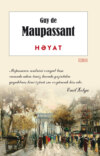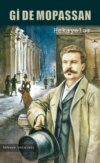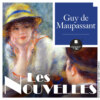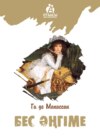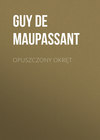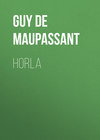Kitabı oku: «Complete Original Short Stories of Guy De Maupassant», sayfa 89
THE PENGUINS’ ROCK
This is the season for penguins
From April to the end of May, before the Parisian visitors arrive, one sees, all at once, on the little beach at Etretat several old gentlemen, booted and belted in shooting costume. They spend four or five days at the Hotel Hauville, disappear, and return again three weeks later. Then, after a fresh sojourn, they go away altogether.
One sees them again the following spring.
These are the last penguin hunters, what remain of the old set. There were about twenty enthusiasts thirty or forty years ago; now there are only a few of the enthusiastic sportsmen.
The penguin is a very rare bird of passage, with peculiar habits. It lives the greater part of the year in the latitude of Newfoundland and the islands of St. Pierre and Miquelon. But in the breeding season a flight of emigrants crosses the ocean and comes every year to the same spot to lay their eggs, to the Penguins’ Rock near Etretat. They are found nowhere else, only there. They have always come there, have always been chased away, but return again, and will always return. As soon as the young birds are grown they all fly away, and disappear for a year.
Why do they not go elsewhere? Why not choose some other spot on the long white, unending cliff that extends from the Pas-de-Calais to Havre? What force, what invincible instinct, what custom of centuries impels these birds to come back to this place? What first migration, what tempest, possibly, once cast their ancestors on this rock? And why do the children, the grandchildren, all the descendants of the first parents always return here?
There are not many of them, a hundred at most, as if one single family, maintaining the tradition, made this annual pilgrimage.
And each spring, as soon as the little wandering tribe has taken up its abode an the rock, the same sportsmen also reappear in the village. One knew them formerly when they were young; now they are old, but constant to the regular appointment which they have kept for thirty or forty years. They would not miss it for anything in the world.
It was an April evening in one of the later years. Three of the old sportsmen had arrived; one was missing – M. d’Arnelles.
He had written to no one, given no account of himself. But he was not dead, like so many of the rest; they would have heard of it. At length, tired of waiting for him, the other three sat down to table. Dinner was almost over when a carriage drove into the yard of the hotel, and the late corner presently entered the dining room.
He sat down, in a good humor, rubbing his hands, and ate with zest. When one of his comrades remarked with surprise at his being in a frock-coat, he replied quietly:
“Yes, I had no time to change my clothes.”
They retired on leaving the table, for they had to set out before daybreak in order to take the birds unawares.
There is nothing so pretty as this sport, this early morning expedition.
At three o’clock in the morning the sailors awoke the sportsmen by throwing sand against the windows. They were ready in a few minutes and went down to the beach. Although it was still dark, the stars had paled a little. The sea ground the shingle on the beach. There was such a fresh breeze that it made one shiver slightly in spite of one’s heavy clothing.
Presently two boats were pushed down the beach, by the sailors, with a sound as of tearing cloth, and were floated on the nearest waves. The brown sail was hoisted, swelled a little, fluttered, hesitated and swelling out again as round as a paunch, carried the boats towards the large arched entrance that could be faintly distinguished in the darkness.
The sky became clearer, the shadows seemed to melt away. The coast still seemed veiled, the great white coast, perpendicular as a wall.
They passed through the Manne-Porte, an enormous arch beneath which a ship could sail; they doubled the promontory of La Courtine, passed the little valley of Antifer and the cape of the same name; and suddenly caught sight of a beach on which some hundreds of seagulls were perched.
That was the Penguins’ Rock. It was just a little protuberance of the cliff, and on the narrow ledges of rock the birds’ heads might be seen watching the boats.
They remained there, motionless, not venturing to fly off as yet. Some of them perched on the edges, seated upright, looked almost like bottles, for their little legs are so short that when they walk they glide along as if they were on rollers. When they start to fly they cannot make a spring and let themselves fall like stones almost down to the very men who are watching them.
They know their limitation and the danger to which it subjects them, and cannot make up their minds to fly away.
But the boatmen begin to shout, beating the sides of the boat with the wooden boat pins, and the birds, in affright, fly one by one into space until they reach the level of the waves. Then, moving their wings rapidly, they scud, scud along until they reach the open sea; if a shower of lead does not knock them into the water.
For an hour the firing is kept up, obliging them to give up, one after another. Sometimes the mother birds will not leave their nests, and are riddled with shot, causing drops of blood to spurt out on the white cliff, and the animal dies without having deserted her eggs.
The first day M. d’Arnelles fired at the birds with his habitual zeal; but when the party returned toward ten o’clock, beneath a brilliant sun, which cast great triangles of light on the white cliffs along the coast he appeared a little worried, and absentminded, contrary to his accustomed manner.
As soon as they got on shore a kind of servant dressed in black came up to him and said something in a low tone. He seemed to reflect, hesitate, and then replied:
“No, to-morrow.”
The following day they set out again. This time M, d’Arnelles frequently missed his aim, although the birds were close by. His friends teased him, asked him if he were in love, if some secret sorrow was troubling his mind and heart. At length he confessed.
“Yes, indeed, I have to leave soon, and that annoys me.”
“What, you must leave? And why?”
“Oh, I have some business that calls me back. I cannot stay any longer.”
They then talked of other matters.
As soon as breakfast was over the valet in black appeared. M. d’Arnelles ordered his carriage, and the man was leaving the room when the three sportsmen interfered, insisting, begging, and praying their friend to stay. One of them at last said:
“Come now, this cannot be a matter of such importance, for you have already waited two days.”
M. d’Arnelles, altogether perplexed, began to think, evidently baffled, divided between pleasure and duty, unhappy and disturbed.
After reflecting for some time he stammered:
“The fact is – the fact is – I am not alone here. I have my son-in-law.”
There were exclamations and shouts of “Your son-in-law! Where is he?”
He suddenly appeared confused and his face grew red.
“What! do you not know? Why – why – he is in the coach house. He is dead.”
They were all silent in amazement.
M. d’Arnelles continued, more and more disturbed:
“I had the misfortune to lose him; and as I was taking the body to my house, in Briseville, I came round this way so as not to miss our appointment. But you can see that I cannot wait any longer.”
Then one of the sportsmen, bolder than the rest said:
“Well, but – since he is dead – it seems to me that he can wait a day longer.”
The others chimed in:
“That cannot be denied.”
M. d’Arnelles appeared to be relieved of a great weight, but a little uneasy, nevertheless, he asked:
“But, frankly – do you think – ”
The three others, as one man, replied:
“Parbleu! my dear boy, two days more or less can make no difference in his present condition.”
And, perfectly calmly, the father-in-law turned to the undertaker’s assistant, and said:
“Well, then, my friend, it will be the day after tomorrow.”
A FAMILY
I was to see my old friend, Simon Radevin, of whom I had lost sight for fifteen years. At one time he was my most intimate friend, the friend who knows one’s thoughts, with whom one passes long, quiet, happy evenings, to whom one tells one’s secret love affairs, and who seems to draw out those rare, ingenious, delicate thoughts born of that sympathy that gives a sense of repose.
For years we had scarcely been separated; we had lived, travelled, thought and dreamed together; had liked the same things, had admired the same books, understood the same authors, trembled with the same sensations, and very often laughed at the same individuals, whom we understood completely by merely exchanging a glance.
Then he married. He married, quite suddenly, a little girl from the provinces, who had come to Paris in search of a husband. How in the world could that little thin, insipidly fair girl, with her weak hands, her light, vacant eyes, and her clear, silly voice, who was exactly like a hundred thousand marriageable dolls, have picked up that intelligent, clever young fellow? Can any one understand these things? No doubt he had hoped for happiness, simple, quiet and long-enduring happiness, in the arms of a good, tender and faithful woman; he had seen all that in the transparent looks of that schoolgirl with light hair.
He had not dreamed of the fact that an active, living and vibrating man grows weary of everything as soon as he understands the stupid reality, unless, indeed, he becomes so brutalized that he understands nothing whatever.
What would he be like when I met him again? Still lively, witty, light-hearted and enthusiastic, or in a state of mental torpor induced by provincial life? A man may change greatly in the course of fifteen years!
The train stopped at a small station, and as I got out of the carriage, a stout, a very stout man with red cheeks and a big stomach rushed up to me with open arms, exclaiming: “George!” I embraced him, but I had not recognized him, and then I said, in astonishment: “By Jove! You have not grown thin!” And he replied with a laugh:
“What did you expect? Good living, a good table and good nights! Eating and sleeping, that is my existence!”
I looked at him closely, trying to discover in that broad face the features I held so dear. His eyes alone had not changed, but I no longer saw the same expression in them, and I said to myself: “If the expression be the reflection of the mind, the thoughts in that head are not what they used to be formerly; those thoughts which I knew so well.”
Yet his eyes were bright, full of happiness and friendship, but they had not that clear, intelligent expression which shows as much as words the brightness of the intellect. Suddenly he said:
“Here are my two eldest children.” A girl of fourteen, who was almost a woman, and a boy of thirteen, in the dress of a boy from a Lycee, came forward in a hesitating and awkward manner, and I said in a low voice: “Are they yours?” “Of course they are,” he replied, laughing. “How many have you?” “Five! There are three more at home.”
He said this in a proud, self-satisfied, almost triumphant manner, and I felt profound pity, mingled with a feeling of vague contempt, for this vainglorious and simple reproducer of his species.
I got into a carriage which he drove himself, and we set off through the town, a dull, sleepy, gloomy town where nothing was moving in the streets except a few dogs and two or three maidservants. Here and there a shopkeeper, standing at his door, took off his hat, and Simon returned his salute and told me the man’s name; no doubt to show me that he knew all the inhabitants personally, and the thought struck me that he was thinking of becoming a candidate for the Chamber of Deputies, that dream of all those who bury themselves in the provinces.
We were soon out of the town, and the carriage turned into a garden that was an imitation of a park, and stopped in front of a turreted house, which tried to look like a chateau.
“That is my den,” said Simon, so that I might compliment him on it. “It is charming,” I replied.
A lady appeared on the steps, dressed for company, and with company phrases all ready prepared. She was no longer the light-haired, insipid girl I had seen in church fifteen years previously, but a stout lady in curls and flounces, one of those ladies of uncertain age, without intellect, without any of those things that go to make a woman. In short, she was a mother, a stout, commonplace mother, a human breeding machine which procreates without any other preoccupation but her children and her cook-book.
She welcomed me, and I went into the hall, where three children, ranged according to their height, seemed set out for review, like firemen before a mayor, and I said: “Ah! ah! so there are the others?” Simon, radiant with pleasure, introduced them: “Jean, Sophie and Gontran.”
The door of the drawing-room was open. I went in, and in the depths of an easy-chair, I saw something trembling, a man, an old, paralyzed man. Madame Radevin came forward and said: “This is my grandfather, monsieur; he is eighty-seven.” And then she shouted into the shaking old man’s ears: “This is a friend of Simon’s, papa.” The old gentleman tried to say “good-day” to me, and he muttered: “Oua, oua, oua,” and waved his hand, and I took a seat saying: “You are very kind, monsieur.”
Simon had just come in, and he said with a laugh: “So! You have made grandpapa’s acquaintance. He is a treasure, that old man; he is the delight of the children. But he is so greedy that he almost kills himself at every meal; you have no idea what he would eat if he were allowed to do as he pleased. But you will see, you will see. He looks at all the sweets as if they were so many girls. You never saw anything so funny; you will see presently.”
I was then shown to my room, to change my dress for dinner, and hearing a great clatter behind me on the stairs, I turned round and saw that all the children were following me behind their father; to do me honor, no doubt.
My windows looked out across a dreary, interminable plain, an ocean of grass, of wheat and of oats, without a clump of trees or any rising ground, a striking and melancholy picture of the life which they must be leading in that house.
A bell rang; it was for dinner, and I went downstairs. Madame Radevin took my arm in a ceremonious manner, and we passed into the dining-room. A footman wheeled in the old man in his armchair. He gave a greedy and curious look at the dessert, as he turned his shaking head with difficulty from one dish to the other.
Simon rubbed his hands: “You will be amused,” he said; and all the children understanding that I was going to be indulged with the sight of their greedy grandfather, began to laugh, while their mother merely smiled and shrugged her shoulders, and Simon, making a speaking trumpet of his hands, shouted at the old man: “This evening there is sweet creamed rice!” The wrinkled face of the grandfather brightened, and he trembled more violently, from head to foot, showing that he had understood and was very pleased. The dinner began.
“Just look!” Simon whispered. The old man did not like the soup, and refused to eat it; but he was obliged to do it for the good of his health, and the footman forced the spoon into his mouth, while the old man blew so energetically, so as not to swallow the soup, that it was scattered like a spray all over the table and over his neighbors. The children writhed with laughter at the spectacle, while their father, who was also amused, said: “Is not the old man comical?”
During the whole meal they were taken up solely with him. He devoured the dishes on the table with his eyes, and tried to seize them and pull them over to him with his trembling hands. They put them almost within his reach, to see his useless efforts, his trembling clutches at them, the piteous appeal of his whole nature, of his eyes, of his mouth and of his nose as he smelt them, and he slobbered on his table napkin with eagerness, while uttering inarticulate grunts. And the whole family was highly amused at this horrible and grotesque scene.
Then they put a tiny morsel on his plate, and he ate with feverish gluttony, in order to get something more as soon as possible, and when the sweetened rice was brought in, he nearly had a fit, and groaned with greediness, and Gontran called out to him:
“You have eaten too much already; you can have no more.” And they pretended not to give him any. Then he began to cry; he cried and trembled more violently than ever, while all the children laughed. At last, however, they gave him his helping, a very small piece; and as he ate the first mouthful, he made a comical noise in his throat, and a movement with his neck as ducks do when they swallow too large a morsel, and when he had swallowed it, he began to stamp his feet, so as to get more.
I was seized with pity for this saddening and ridiculous Tantalus, and interposed on his behalf:
“Come, give him a little more rice!” But Simon replied: “Oh! no, my dear fellow, if he were to eat too much, it would harm him, at his age.”
I held my tongue, and thought over those words. Oh, ethics! Oh, logic! Oh, wisdom! At his age! So they deprived him of his only remaining pleasure out of regard for his health! His health! What would he do with it, inert and trembling wreck that he was? They were taking care of his life, so they said. His life? How many days? Ten, twenty, fifty, or a hundred? Why? For his own sake? Or to preserve for some time longer the spectacle of his impotent greediness in the family.
There was nothing left for him to do in this life, nothing whatever. He had one single wish left, one sole pleasure; why not grant him that last solace until he died?
After we had played cards for a long time, I went up to my room and to bed; I was low-spirited and sad, sad, sad! and I sat at my window. Not a sound could be heard outside but the beautiful warbling of a bird in a tree, somewhere in the distance. No doubt the bird was singing in a low voice during the night, to lull his mate, who was asleep on her eggs. And I thought of my poor friend’s five children, and pictured him to myself, snoring by the side of his ugly wife.
SUICIDES
To Georges Legrand
Hardly a day goes by without our reading a news item like the following in some newspaper:
“On Wednesday night the people living in No. 40 Rue de – , were awakened by two successive shots. The explosions seemed to come from the apartment occupied by M. X – . The door was broken in and the man was found bathed in his blood, still holding in one hand the revolver with which he had taken his life.
“M. X – was fifty-seven years of age, enjoying a comfortable income, and had everything necessary to make him happy. No cause can be found for his action.”
What terrible grief, what unknown suffering, hidden despair, secret wounds drive these presumably happy persons to suicide? We search, we imagine tragedies of love, we suspect financial troubles, and, as we never find anything definite, we apply to these deaths the word “mystery.”
A letter found on the desk of one of these “suicides without cause,” and written during his last night, beside his loaded revolver, has come into our hands. We deem it rather interesting. It reveals none of those great catastrophes which we always expect to find behind these acts of despair; but it shows us the slow succession of the little vexations of life, the disintegration of a lonely existence, whose dreams have disappeared; it gives the reason for these tragic ends, which only nervous and high-strung people can understand.
Here it is:
“It is midnight. When I have finished this letter I shall kill myself. Why? I shall attempt to give the reasons, not for those who may read these lines, but for myself, to kindle my waning courage, to impress upon myself the fatal necessity of this act which can, at best, be only deferred.
“I was brought up by simple-minded parents who were unquestioning believers. And I believed as they did.
“My dream lasted a long time. The last veil has just been torn from my eyes.
“During the last few years a strange change has been taking place within me. All the events of Life, which formerly had to me the glow of a beautiful sunset, are now fading away. The true meaning of things has appeared to me in its brutal reality; and the true reason for love has bred in me disgust even for this poetic sentiment: ‘We are the eternal toys of foolish and charming illusions, which are always being renewed.’
“On growing older, I had become partly reconciled to the awful mystery of life, to the uselessness of effort; when the emptiness of everything appeared to me in a new light, this evening, after dinner.
“Formerly, I was happy! Everything pleased me: the passing women, the appearance of the streets, the place where I lived; and I even took an interest in the cut of my clothes. But the repetition of the same sights has had the result of filling my heart with weariness and disgust, just as one would feel were one to go every night to the same theatre.
“For the last thirty years I have been rising at the same hour; and, at the same restaurant, for thirty years, I have been eating at the same hours the same dishes brought me by different waiters.
“I have tried travel. The loneliness which one feels in strange places terrified me. I felt so alone, so small on the earth that I quickly started on my homeward journey.
“But here the unchanging expression of my furniture, which has stood for thirty years in the same place, the smell of my apartments (for, with time, each dwelling takes on a particular odor) each night, these and other things disgust me and make me sick of living thus.
“Everything repeats itself endlessly. The way in which I put my key in the lock, the place where I always find my matches, the first object which meets my eye when I enter the room, make me feel like jumping out of the window and putting an end to those monotonous events from which we can never escape.
“Each day, when I shave, I feel an inordinate desire to cut my throat; and my face, which I see in the little mirror, always the same, with soap on my cheeks, has several times made me weak from sadness.
“Now I even hate to be with people whom I used to meet with pleasure; I know them so well, I can tell just what they are going to say and what I am going to answer. Each brain is like a circus, where the same horse keeps circling around eternally. We must circle round always, around the same ideas, the same joys, the same pleasures, the same habits, the same beliefs, the same sensations of disgust.
“The fog was terrible this evening. It enfolded the boulevard, where the street lights were dimmed and looked like smoking candles. A heavier weight than usual oppressed me. Perhaps my digestion was bad.
“For good digestion is everything in life. It gives the inspiration to the artist, amorous desires to young people, clear ideas to thinkers, the joy of life to everybody, and it also allows one to eat heartily (which is one of the greatest pleasures). A sick stomach induces scepticism unbelief, nightmares and the desire for death. I have often noticed this fact. Perhaps I would not kill myself, if my digestion had been good this evening.
“When I sat down in the arm-chair where I have been sitting every day for thirty years, I glanced around me, and just then I was seized by such a terrible distress that I thought I must go mad.
“I tried to think of what I could do to run away from myself. Every occupation struck me as being worse even than inaction. Then I bethought me of putting my papers in order.
“For a long time I have been thinking of clearing out my drawers; for, for the last thirty years, I have been throwing my letters and bills pell-mell into the same desk, and this confusion has often caused me considerable trouble. But I feel such moral and physical laziness at the sole idea of putting anything in order that I have never had the courage to begin this tedious business.
“I therefore opened my desk, intending to choose among my old papers and destroy the majority of them.
“At first I was bewildered by this array of documents, yellowed by age, then I chose one.
“Oh! if you cherish life, never disturb the burial place of old letters!
“And if, perchance, you should, take the contents by the handful, close your eyes that you may not read a word, so that you may not recognize some forgotten handwriting which may plunge you suddenly into a sea of memories; carry these papers to the fire; and when they are in ashes, crush them to an invisible powder, or otherwise you are lost – just as I have been lost for an hour.
“The first letters which I read did not interest me greatly. They were recent, and came from living men whom I still meet quite often, and whose presence does not move me to any great extent. But all at once one envelope made me start. My name was traced on it in a large, bold handwriting; and suddenly tears came to my eyes. That letter was from my dearest friend, the companion of my youth, the confidant of my hopes; and he appeared before me so clearly, with his pleasant smile and his hand outstretched, that a cold shiver ran down my back. Yes, yes, the dead come back, for I saw him! Our memory is a more perfect world than the universe: it gives back life to those who no longer exist.
“With trembling hand and dimmed eyes I reread everything that he told me, and in my poor sobbing heart I felt a wound so painful that I began to groan as a man whose bones are slowly being crushed.
“Then I travelled over my whole life, just as one travels along a river. I recognized people, so long forgotten that I no longer knew their names. Their faces alone lived in me. In my mother’s letters I saw again the old servants, the shape of our house and the little insignificant odds and ends which cling to our minds.
“Yes, I suddenly saw again all my mother’s old gowns, the different styles which she adopted and the several ways in which she dressed her hair. She haunted me especially in a silk dress, trimmed with old lace; and I remembered something she said one day when she was wearing this dress. She said: ‘Robert, my child, if you do not stand up straight you will be round-shouldered all your life.’
“Then, opening another drawer, I found myself face to face with memories of tender passions: a dancing-pump, a torn handkerchief, even a garter, locks of hair and dried flowers. Then the sweet romances of my life, whose living heroines are now white-haired, plunged me into the deep melancholy of things. Oh, the young brows where blond locks curl, the caress of the hands, the glance which speaks, the hearts which beat, that smile which promises the lips, those lips which promise the embrace! And the first kiss-that endless kiss which makes you close your eyes, which drowns all thought in the immeasurable joy of approaching possession!
“Taking these old pledges of former love in both my hands, I covered them with furious caresses, and in my soul, torn by these memories, I saw them each again at the hour of surrender; and I suffered a torture more cruel than all the tortures invented in all the fables about hell.
“One last letter remained. It was written by me and dictated fifty years ago by my writing teacher. Here it is:
“‘MY DEAR LITTLE MAMMA:
“‘I am seven years old to-day. It is the age of reason. I take advantage of it to thank you for having brought me into this world.
“‘Your little son, who loves you
“‘ROBERT.’
“It is all over. I had gone back to the beginning, and suddenly I turned my glance on what remained to me of life. I saw hideous and lonely old age, and approaching infirmities, and everything over and gone. And nobody near me!
“My revolver is here, on the table. I am loading it.. Never reread your old letters!”
And that is how many men come to kill themselves; and we search in vain to discover some great sorrow in their lives.




